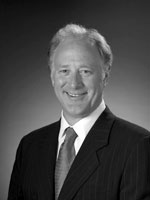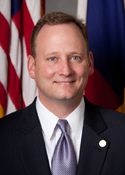Texas State Capital Residency Repeal Amendment, Proposition 3 (2015)
| Proposition 3 | |
|---|---|
 | |
| Type | Amendment |
| Origin | Texas Legislature |
| Topic | State executive officials |
| Status | Approved |
| Texas 2015 ballot |
|---|
| Proposition 1 - Taxes |
| Proposition 2 - Taxes |
| Proposition 3 - Residency |
| Proposition 4 - Gambling |
| Proposition 5 - Roads |
| Proposition 6 - Hunting |
| Proposition 7 - Taxes |
| All 2015 U.S. measures |
|---|
The Texas State Capital Residency Repeal Amendment, Proposition 3 was on the November 3, 2015 ballot in Texas as a legislatively referred constitutional amendment, where it was approved.
| Voting yes would have repealed the constitutional requirement that statewide-elected executive officials live in the state capital. |
| Voting no would have kept current laws unchanged. Statewide-elected executive officials would continue to be required to live in the state capital. |
Offices affected by the repeal were the Attorney General, Comptroller of Public Accounts, Land Commissioner and "any statutory State officer who is elected by the electorate of Texas at large." The Texas Governor, Texas Lieutenant Governor, Texas Supreme Court and Texas Court of Criminal Appeals were still required to live in the capital as mandated by other constitutional provisions.[1][2]
Election results
| Texas Proposition 3 | ||||
|---|---|---|---|---|
| Result | Votes | Percentage | ||
| 1022525 | 66.09% | |||
| No | 524625 | 33.91% | ||
Election results via: Texas Secretary of State
Text of measure
Ballot title
The official ballot title was:[1]
| “ | The constitutional amendment repealing the requirement that state officers elected by voters statewide reside in the state capital.[3] | ” |
Constitutional changes
- See also: Article 4, Texas Constitution
The measure amended Section 23 of Article 4 of the Texas Constitution.[1] The following underlined text would was added and struck-through text removed:
Background
The residency requirement was in the Texas Constitution in Section 23 of Article IV since it was adopted in 1876. Under Section 13, during the session of the legislature, the governor of Texas is required to live "where its sessions are held, and at all other times at the seat of Government, except when by act of the Legislature, he may be required or authorized to reside elsewhere."
Support
Officials
- Rep. Donna Campbell (R-25)[4]
- Sen. Kirk Watson (D-14)
Organizations
- Texas Democratic Party[5]
- Texas Republican County Chairmen's Association
Arguments in favor
Rep. Donna Campbell, the proposition's author, argued:[6]
| “ | Austin’s great, but to mandate that someone must have a residency there - and if you don’t have the dollars, you have to sell your home and if you have a family you have to uproot your children - it’s an unfair burden.[3] | ” |
According to the State Affairs Committee of the Texas Senate, the amendment would provide the following benefits:[7]
| “ | Interested parties point out that the 1876 Texas Constitution required certain statewide elected officials to reside in the capital of Texas and that this requirement has not changed since that constitution was adopted. The parties note that advances in transportation and technology have rendered this requirement obsolete and that it is no longer necessary for an official to reside in the capital. These parties assert that removing this requirement will allow greater flexibility for statewide elected officials and reduce the burden this requirement places on the officials and their families.[3] | ” |
Bill Fairbrother, legislative director of the Texas Republican County Chairmen’s Association, said:[8]
| “ | Austin is a very Democratic area. All the statewide elected officials are Republican. If they want to live outside of Austin, they should be allowed to live in an area that’s more like the areas where they got elected from.[3] | ” |
Sen. Kirk Watson argued:[9]
| “ | The reason this was a constitutional provision was because (in the 19th Century) it was difficult to communicate and get back to Austin when you needed folks in Austin. And, so, there was a requirement that if you’re elected to be in one of the executive branch offices, you would locate in the city. But now with technology and the ability to be online and telework, I guess it works out well that people elected to statewide office can engage in what we call teleworking.[3] | ” |
The House Research Organization provided supporting and opposing arguments in the group's bill analysis. The following is an excerpt from the support statement:[10]
| “ | SJR 52 would remove the requirement in the Texas Constitution that certain statewide elected officials reside in Austin during their terms in office. This requirement made sense when the Constitution was adopted in 1876 because it could take days to travel to Austin. The requirement is no longer necessary due to the many advances in transportation and technology that could allow officials to easily travel to Austin or to manage their duties while living elsewhere. The proposed constitutional amendment has received support from representatives of both major political parties, and it is time to give voters a choice in this matter.
Officials may want to live in cities surrounding Austin and commute to work. It does not make sense to limit an elected official's choice of where to live. In addition, considerations involving work and school for an elected official's spouse and children could make permanently residing in Austin difficult. Some officials elected statewide who had previously represented a legislative district might not want to lose their local residency in case they later decide to seek an office that requires them to reside in a certain district.[3] |
” |
Opposition
Arguments against
Re. Tom Craddick (R-82) said he supported allowing statewide elected officials to live within 50 miles of Austin, but not anywhere in the state. He said:[11]
| “ | How are they going to be at work every day? I think we’re going to see a real change in what we got. I think this is a bad bill.[3] | ” |
Phillip Martin, deputy director of liberal advocacy organization Progress Texas, stated:[6]
| “ | Austin is the seat of government and I don’t want a computer in that seat. The first priority should be what’s convenient for the people of Texas, not for the elected servants who have some of the greatest jobs in the world.[3] | ” |
In an opinion article for the San Antonio Express-News, Rick Casey wrote:
| “ | There remains a value to having all our leaders in one basket, so to speak. For one thing, they need to be available to their employees. Plus, it’s easier for the public — or our proxies in the media — to keep an eye on them. Dispersing them could also lead to a rise in our cost of living. Corporations would have to pass along the costs for their lobbyists to travel first-class around a state bigger than the nation of France.[3] | ” |
Rep. Walter T. "Four" Price said:[12]
| “ | I voted against it because my thinking was that statewide elected officials office in Austin and people need to know they’ll be there when they need to contact them and know where to find them. They know when they run for that office that they need to be in Austin and frankly, my feeling was that I didn’t want my statewide officials living so far away.[3] | ” |
The House Research Organization provided supporting and opposing arguments in the group's bill analysis. The following is an excerpt from the opposition statement:[10]
| “ | SJR 52 would change a provision in the Constitution that has served Texans well. Those elected to guide large agencies like the comptroller's office, the land office, or the attorney general's office should be present at their respective agency headquarters in Austin on a daily basis. These officials knew of the constitutional requirement to reside in the seat of Texas government when they decided to seek the office.
While technology has made it easier for some workers to conduct business from home, such an arrangement might not be appropriate for a statewide elected official. Being physically present in Austin would ensure these officials are available to handle the important business of the state and meet with other state leaders as necessary.[3] |
” |
Media editorials
Support
The Dallas Morning News editorial board wrote:[13]
| “ | In a time of teleconferencing and jet travel, a residency requirement is onerous and possibly harmful to the state. That’s why we recommend a yes vote on Proposition 3, which would amend the constitution to remove the residency requirement.
The main reason is less to make life easier on politicians than it is to ensure that the best candidates stand for office. The problem with this rule is that it costs us potentially good candidates who might not be willing to burden themselves or their families with picking up stakes to move to Austin. Voters and the media can determine whether these officials are spending enough time in the capital to do their jobs effectively. Those who are gone constantly for personal reasons should hear about it. But what made sense in the years after the Civil War makes far less sense today, and we should amend this law.[3] |
” |
Opposition
The Houston Chronicle recommended a vote against the amendment, arguing:[14]
| “ | This proposal would repeal the requirement that state officers elected by voters statewide reside in the state capital. Its supporters argue that modern transportation, e-mail and the Internet make telecommuting feasible for state officials, who while working at home can get to Austin any time they need to.
We disagree. Statewide officials need to be in their state capital offices daily to interact with their staff, to meet with other state officials and to stay in touch with the people who elected them. There's even a symbolic significance to having these elected officials leave their homes for awhile and journey to Austin to serve their fellow Texans. (It's also easier to keep an eye on attorneys general with legal problems.)[3] |
” |
The Austin American-Statesman editorial board said:[15]
| “ | Proposition 3 would remove from the Texas Constitution the historical requirement that statewide officeholders live in Austin. The proposed constitutional permission to live outside the state capital wouldn’t apply to the governor, Texas Supreme Court and Court of Criminal Appeals justices — they still would be required to reside here — but the attorney general, comptroller and agriculture, land and railroad commissioners could put Austin in their rearview mirrors.
Republican state Sen. Donna Campbell of New Braunfels, the initiative’s sponsor, says technology has rendered the residency requirement obsolete. Not really. An effective state leader doesn’t work in isolation — and however wonderful technology is, there is no substitute for being where an agency’s work is actually getting done or where the political action is.[3] |
” |
Path to the ballot
- See also: Amending the Texas Constitution
The amendment was filed by Rep. Donna Campbell (R-25) as Senate Joint Resolution 52 on March 12, 2015.[16]
A two-thirds vote in both chambers of the Texas State Legislature was required to refer this amendment to the ballot. Texas is one of 16 states that require a two-thirds supermajority vote in both chambers. The Texas Senate approved the amendment on April 20, 2015, with 29 senators voting "yea" and one voting "nay." On May 27, 2015, the Texas House of Representatives passed the measure, with 102 representatives voting "yea" and 43 voting "nay." It was enrolled the same day.[16]
Senate vote
April 20, 2015, Senate vote
| Texas SJR 52 Senate Vote | ||||
|---|---|---|---|---|
| Result | Votes | Percentage | ||
| 29 | 96.67% | |||
| No | 1 | 3.33% | ||
House vote
May 27, 2015, House vote
| Texas SJR 52 House Vote | ||||
|---|---|---|---|---|
| Result | Votes | Percentage | ||
| 102 | 70.34% | |||
| No | 43 | 29.66% | ||
"No" votes
Between the Texas House of Representatives and Texas Senate, 44 legislators voted against referring the amendment to the ballot. These legislators were:[16]
- Sen. Craig Estes (R-30)
- Rep. Alma Allen (D-131)
- Rep. Roberto Alonzo (D-104)
- Rep. Diego Bernal (D-123)
- Rep. Cesar Blanco (D-76)
- Rep. Nicole Collier (D-95)
- Rep. Tom Craddick (R-82)
- Rep. Yvonne Davis (D-111)
- Rep. Joe Deshotel (D-22)
- Rep. Harold Dutton, Jr. (D-142)
- Rep. Jessica Cristina Farrar (D-148)
- Rep. Rick Galindo (R-117)
- Rep. Helen Giddings (D-109)
- Rep. Mary E. Gonzalez (D-75)
- Rep. Roland Gutierrez (D-119)
- Rep. Ana Hernandez Luna (D-143)
- Rep. Abel Herrero (D-34)
- Rep. Donna Howard (D-48)
- Rep. Celia Israel (D-50)
- Rep. Eric Johnson (D-100)
- Rep. Kyle J. Kacal (R-12)
- Rep. Ken King (R-88)
- Rep. Lyle Larson (R-122)
- Rep. Oscar Longoria (D-35)
- Rep. Marisa Marquez (D-77)
- Rep. Armando Martinez (D-39)
- Rep. Trey Martinez Fischer (D-116)
- Rep. Borris Miles (D-146)
- Rep. Ina Minjarez (D-124)
- Rep. Joe Moody (D-78)
- Rep. Sergio Munoz, Jr. (D-36)
- Rep. Poncho Nevarez (D-74)
- Rep. Tan Parker (R-63)
- Rep. Four Price (R-87)
- Rep. Ron Reynolds (D-27)
- Rep. Justin Rodriguez (D-125)
- Rep. Ramon Romero, Jr. (D-90)
- Rep. Toni Rose (D-110)
- Rep. J.D. Sheffield (R-59)
- Rep. Senfronia Thompson (D-141)
- Rep. Chris Turner (D-101)
- Rep. Sylvester Turner (D-139)
- Rep. Hubert Vo (D-149)
- Rep. Gene Wu (D-137)
State profile
| Demographic data for Texas | ||
|---|---|---|
| Texas | U.S. | |
| Total population: | 27,429,639 | 316,515,021 |
| Land area (sq mi): | 261,232 | 3,531,905 |
| Race and ethnicity** | ||
| White: | 74.9% | 73.6% |
| Black/African American: | 11.9% | 12.6% |
| Asian: | 4.2% | 5.1% |
| Native American: | 0.5% | 0.8% |
| Pacific Islander: | 0.1% | 0.2% |
| Two or more: | 2.5% | 3% |
| Hispanic/Latino: | 38.4% | 17.1% |
| Education | ||
| High school graduation rate: | 81.9% | 86.7% |
| College graduation rate: | 27.6% | 29.8% |
| Income | ||
| Median household income: | $53,207 | $53,889 |
| Persons below poverty level: | 19.9% | 11.3% |
| Source: U.S. Census Bureau, "American Community Survey" (5-year estimates 2010-2015) Click here for more information on the 2020 census and here for more on its impact on the redistricting process in Texas. **Note: Percentages for race and ethnicity may add up to more than 100 percent because respondents may report more than one race and the Hispanic/Latino ethnicity may be selected in conjunction with any race. Read more about race and ethnicity in the census here. | ||
Presidential voting pattern
- See also: Presidential voting trends in Texas
Texas voted Republican in all seven presidential elections between 2000 and 2024.
Pivot Counties (2016)
Ballotpedia identified 206 counties that voted for Donald Trump (R) in 2016 after voting for Barack Obama (D) in 2008 and 2012. Collectively, Trump won these Pivot Counties by more than 580,000 votes. Of these 206 counties, one is located in Texas, accounting for 0.5 percent of the total pivot counties.[17]
Pivot Counties (2020)
In 2020, Ballotpedia re-examined the 206 Pivot Counties to view their voting patterns following that year's presidential election. Ballotpedia defined those won by Trump won as Retained Pivot Counties and those won by Joe Biden (D) as Boomerang Pivot Counties. Nationwide, there were 181 Retained Pivot Counties and 25 Boomerang Pivot Counties. Texas had one Retained Pivot County, 0.55 percent of all Retained Pivot Counties.
More Texas coverage on Ballotpedia
- Elections in Texas
- United States congressional delegations from Texas
- Public policy in Texas
- Endorsers in Texas
- Texas fact checks
- More...
See also
External links
- Senate Joint Resolution 52
- Texas Secretary of State - What's On the Ballot 2015
- Texas Legislative Council 2015 Analyses of Proposed Constitutional Amendments
- Texas House of Representatives House Research Organization Focus Report - Amendments Proposed for November 2015 Ballot
Footnotes
- ↑ 1.0 1.1 1.2 Texas Senate, "SJR No. 52," accessed April 22, 2015
- ↑ The Washington Times, "Referendum would let top Texas officials live outside Austin," September 27, 2015
- ↑ 3.00 3.01 3.02 3.03 3.04 3.05 3.06 3.07 3.08 3.09 3.10 3.11 3.12 3.13 3.14 Note: This text is quoted verbatim from the original source. Any inconsistencies are attributable to the original source. Cite error: Invalid
<ref>tag; name "quotedisclaimer" defined multiple times with different content Cite error: Invalid<ref>tag; name "quotedisclaimer" defined multiple times with different content Cite error: Invalid<ref>tag; name "quotedisclaimer" defined multiple times with different content Cite error: Invalid<ref>tag; name "quotedisclaimer" defined multiple times with different content Cite error: Invalid<ref>tag; name "quotedisclaimer" defined multiple times with different content Cite error: Invalid<ref>tag; name "quotedisclaimer" defined multiple times with different content Cite error: Invalid<ref>tag; name "quotedisclaimer" defined multiple times with different content Cite error: Invalid<ref>tag; name "quotedisclaimer" defined multiple times with different content Cite error: Invalid<ref>tag; name "quotedisclaimer" defined multiple times with different content Cite error: Invalid<ref>tag; name "quotedisclaimer" defined multiple times with different content Cite error: Invalid<ref>tag; name "quotedisclaimer" defined multiple times with different content Cite error: Invalid<ref>tag; name "quotedisclaimer" defined multiple times with different content Cite error: Invalid<ref>tag; name "quotedisclaimer" defined multiple times with different content Cite error: Invalid<ref>tag; name "quotedisclaimer" defined multiple times with different content - ↑ Texas Legislature, "SJR No. 52 Authors," accessed April 22, 2015
- ↑ Texas Legislature, "SJR No. 52 Witnesses," accessed April 22, 2015
- ↑ 6.0 6.1 The Washington Times, "Referendum would let top Texas officials live outside Austin," September 27, 2015
- ↑ Texas Legislature, "SJR No. 52 Senate State Affairs Committee Analysis," accessed May 27, 2015
- ↑ Governing.com, "Texas 2015 Ballot: Should Politicians Have to Live Where They Work?", October 5, 2015
- ↑ Amarillo Globe-News, "Texas' Prop. 3 would repeal 129-year-old law requiring statewide officials live in Austin," October 18, 2015
- ↑ 10.0 10.1 House Research Organization, "Bill analysis," May 25, 2015
- ↑ The Texas Tribune, "Residency Requirement for Statewide Elected Officials Could Change," May 25, 2015
- ↑ Cite error: Invalid
<ref>tag; no text was provided for refs namednews - ↑ The Dallas Morning News, "Editorial: We recommend yes vote on Proposition 3," October 6, 2015
- ↑ Chron, "Texas propositions," October 14, 2015
- ↑ Austin American-Statesman, "Keep rule requiring Texas officeholders to live in state capital," October 30, 2015
- ↑ 16.0 16.1 16.2 Cite error: Invalid
<ref>tag; no text was provided for refs namedhistory - ↑ The raw data for this study was provided by Dave Leip of Atlas of U.S. Presidential Elections.
 |
State of Texas Austin (capital) |
|---|---|
| Elections |
What's on my ballot? | Elections in 2026 | How to vote | How to run for office | Ballot measures |
| Government |
Who represents me? | U.S. President | U.S. Congress | Federal courts | State executives | State legislature | State and local courts | Counties | Cities | School districts | Public policy |







